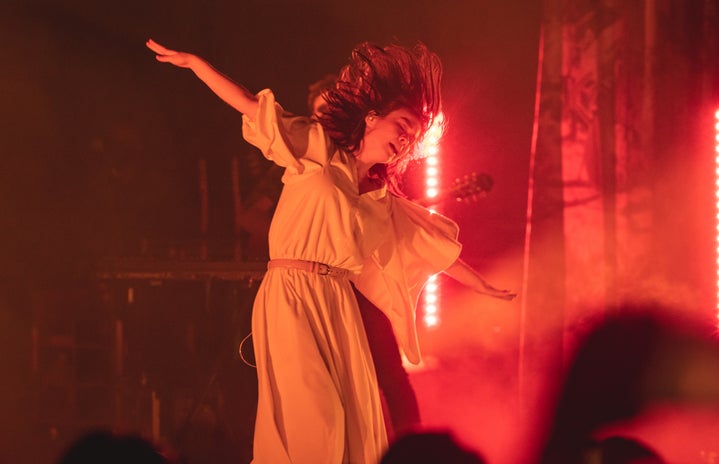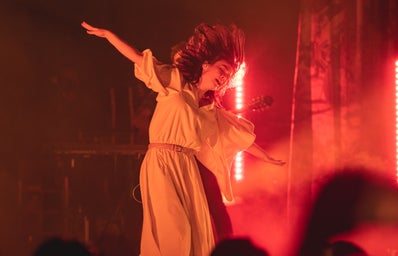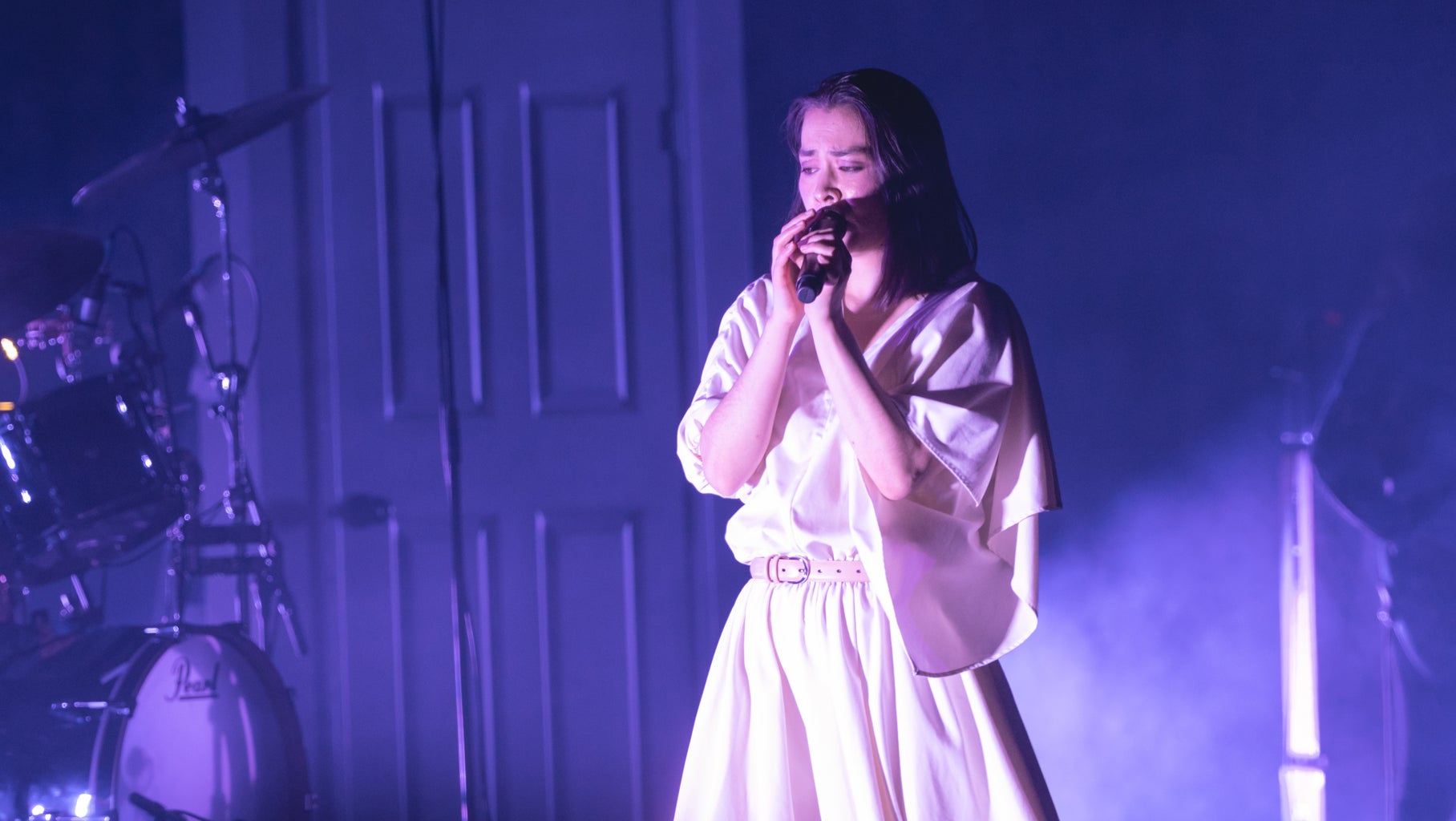This year, September served as a great month for women in music. Olivia Rodrigo released her sophomore album GUTS on the same day that Icelandic singer Laufey released a second album of her own, Bewitched. Both singers went on to break records in their respective categories, and it was exactly a week later that Mitski came out with her new album, The Land is Inhospitable and So Are We.
Since 2020, I’ve been a huge fan of Mitski’s music, always fascinated by her lyricism, which I find to be filled with powerful symbolism, and themes that are often even directly connected to the instrumental aspects of her songs. The Land did not disappoint. Every single song on the album explored a tough theme or emotion going from self-control to lack thereof, from loss to love, to the relationship between self and soul. The Land is Inhospitable and So Are We has a song for everyone, and I will break down some of the album’s stand-out songs as well as a few of my own favourites based on commonly found themes from the album, mapping out its melodramatic journey.
The album kicks off with previously released single, “Bug Like an Angel,” a song describing an unhealthy relationship with drinking and the cycle of addiction. Subtle themes of religion, family, and broken promises paired with gentle guitar chords and a choir of gentler voices are what give the song its melancholic feel. In a video breaking down the song, Mitski describes how she used the song’s chord progressions to simulate feeling off-balanced and explains the symbolism of a bug “like an angel” visually. “I wanted to paint a picture of someone drinking out of a glass, and there’s a little bit left in the glass, and they’re drinking like this,” She says, tipping her imaginary glass up to the ceiling, “and they realize that there’s a bug stuck at the bottom of their glass, and because it’s stuck, like this, at the bottom, and it looks like there’s an angel in the sky.” You can watch the equally as somber music video for “Bug Like an Angel” below.
The second song on the album, “Buffalo Replaced” is profound in its own way, with juxtaposing themes of city living with those of nature and the idea of being wild and free. With a steady beat of drums and guitar that inspired the Americana soundscapes found in the rest of the album, Mitski uses the song to appreciate the freedom of being and existing, wild and free. It almost feels like a callback to the second song on one of her previous albums, “Townie”, which chronicles the rebellious, wild, and free but self-destructive behaviour of a teenager. This time, however, Mitski sings about this wild freedom from a far more matured perspective.
Mitski is recognized in pop culture most often for her saddest songs, and “I Don’t Like My Mind,” just might be up there as one of them. It describes the pressing anxieties of one’s mind that never seem to go away, and how being alone too long with one’s own thoughts might result in self-destructive behaviour. Mitski describes coping with this by blasting music and working constantly to avoid having to face these underlying feelings head-on. As the song comes to a close, she begs in an anguished voice for her work not to be taken away from her. Like “Bug Like an Angel,” “I Don’t Like My Mind” describes cyclical behaviour, and how Mitski’s self-destructive actions will only create another upsetting thought that she will eventually have to suppress.
But Mitski shouldn’t just be recognized for the more melancholic and tragic pieces on the album as optimism is just as present on The Land is Inhospitable and So Are We. “Heaven” serves as the album’s most romantic song, with violins that make it feel like a waltz from the get-go. Heaven appreciates the little things with one’s lover that overpower the hardships, such as “sipping on the rest of the coffee [they] left”. The dreamy tone and soft instrumentals only further emphasize how love is like escapism. In this case, the escape is so sweet it is just like heaven, and you can hear more about how Mitski recorded the song here.
My personal favourite song on the album and the one I found most profound is “The Deal,” which tells the story of a person who makes a deal with the night, desperate for someone to take their soul filled with pain and hurt without wanting anything in return. Though the deal is taken, a bird representing the soul appears and sings “You won’t hear me singing, you’re a cage without me.” The end of the song practically feels like the narrator is already feeling the consequences of losing themselves as Mitski’s voice is drowned out and taken entirely by drums that grow louder and faster until the song finally comes to a close.
Nature elements are another consistency throughout the album, and songs “Star,” “The Frost,” and “When Memories Snow” all use metaphors about stars, frost, and snow respectively to describe even more complex feelings including nostalgia, loss, and emotional repression. Each one does an excellent job of telling a story that helps capture these specific feelings, but public opinion has shown that there is one song that has outshone the rest of the album by far.
“My Love Mine All Mine” grew quickly in popularity and even became Mitski’s first ‘Billboard’ Hot 100 Single and the singer was even featured on Genius to break down the song. The song has been interpreted differently by all its listeners, either as a song dedicated towards someone who is the love in question, or as a song that celebrates the human ability to love. In her own words, “I don’t have anything of my own that I can keep… what do I have that’s really actually mine, that can’t be taken away?..It’s this love I feel in me, that I’ve created in me that I’ve built in me, that I’ve held onto and it’s mine for as long as I want it.” Acknowledging that it sounds corny, Mitski still wholeheartedly believes that loving is the best thing she has ever done, and in the song, she asks the moon to reflect her love back down on the earth when she dies so that her love can remain even after she is gone.
The second to last song in the album, “I’m Your Man” is what Mitski describes as a more masculine song, representing the voice of the patriarchy that exists in both men and women because of the system we are raised in. It is a reflection of messages Mitski has received from the culture and the patriarchal, toxic man in Mitski’s head. She describes giving attention to the voice as healing in the same way the Buddha invited the demon god Mara to tea. As the song reflects on a broken relationship and ends with a choir of voices and the sounds of barking dogs, I could not help but think of one of Mitski’s most popular tracks, “I Bet on Losing Dogs” which describes placing faith in a toxic person in a relationship as betting on a dog that you know will lose in a dogfight.
The final and closing song in the album gives us something that we might not have expected from The Land is Inhospitable and So Are We after such a rollercoaster of thought-provoking themes: hope. “I Love Me After You” has fewer lyrics than other songs on the album, but it is a self-empowering celebration of a song about reclaiming yourself and your identity with pride after a detrimental, damaging relationship. Everything feels like yours again, including your authority to do whatever you want, and you are fully healed. In one final reference to the album, in reclamation of her authority, Mitski refers to herself as “King of all the Land” before the song switches to dramatic instrumentals that make for a lengthy fadeout and perfectly dramatic ending.
For me, The Land is Inhospitable and So Are We was a fascinating listen that I couldn’t get enough of. The album’s unique and diverse themes allow it to have something for everyone depending on their mood, and despite the fact that the album’s sound is quite different from what I normally listen to, I was captivated from beginning to end. Mitski’s lyrics do an amazing job of describing isolation, anxiousness, and the rocky relationship one has with self and soul. However, she does an even better job of assuring us that we are not alone, we are free, and that we always have love.



